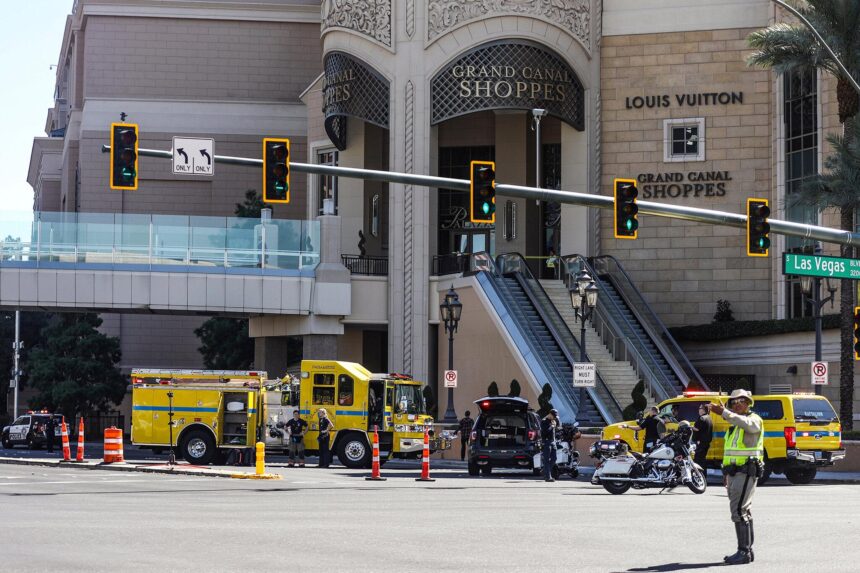Tourist Assault in Las Vegas Casino Sparks Debate Over Security Protocols
Incident Overview: Tourist Assault Highlights Casino Safety Concerns
A recent violent attack involving a tourist inside a well-known Las Vegas casino has ignited intense scrutiny regarding the adequacy of security measures in such entertainment venues. The victim has initiated legal action, accusing the casino management of negligence due to insufficient safety precautions and failure to provide a secure environment. This event underscores the ongoing challenges faced by casinos in safeguarding their guests amid high visitor volumes and complex operational demands.
Critics argue that despite the typically heavy surveillance and security presence in casinos, the existing systems failed to prevent the stabbing. Allegations include slow emergency response and ineffective threat detection mechanisms, raising urgent questions about whether current safety protocols are robust enough to protect patrons from violent incidents.
Evaluating Casino Security: Expert Recommendations for Strengthening Protection
Security specialists advocate for a comprehensive upgrade of casino safety frameworks, emphasizing the integration of cutting-edge technology and enhanced human oversight. Key strategies proposed include:
- Deployment of AI-powered surveillance systems capable of identifying suspicious behavior patterns in real time
- Augmentation of security personnel numbers, particularly during peak operational hours
- Regularly scheduled emergency drills and refined response protocols to ensure swift action during crises
- Thorough background screening for employees and monitoring of guests exhibiting unusual conduct
While some casinos have begun adopting these measures, the recent incident highlights the pressing need for industry-wide standards to ensure consistent safety levels across all gambling establishments.
Legal Perspectives: Assessing Liability and Duty of Care in Casino Negligence Claims
Legal analysts emphasize that the crux of the lawsuit centers on whether the casino fulfilled its duty of care to patrons. Establishments are legally obligated to maintain a secure environment through adequate surveillance, sufficient staffing, and prompt intervention during conflicts. Negligence may be established if the casino failed to take reasonable steps to prevent foreseeable harm.
Factors influencing liability include prior knowledge of potential threats, the visibility and accessibility of security personnel, and the effectiveness of emergency response procedures. Legal experts outline the following critical elements in determining responsibility:
- Duty of Care: Did the casino exercise appropriate vigilance to protect visitors?
- Breach of Duty: Were industry safety standards neglected?
- Causation: Was the casino’s negligence a direct factor in the assault?
- Damages: What level of compensation corresponds to the injuries sustained?
| Security Aspect | Potential Casino Actions | Legal Consequences |
|---|---|---|
| Security Deployment | Installation of comprehensive CCTV and active patrols | May reduce liability if proven effective |
| Response to Incidents | Immediate intervention and conflict resolution | Demonstrates reasonable care and diligence |
| Prior Threat Awareness | Ignoring warnings or reports of suspicious activity | Increases risk of negligence claims |
Strategies for Casinos: Enhancing Safety to Prevent Future Violence
To mitigate risks and improve patron safety, casinos should invest in advanced surveillance technologies combined with proactive human oversight. AI-driven cameras can analyze behavioral cues and alert security teams to potential threats before escalation. Equally important is comprehensive staff training focused on de-escalation techniques and emergency preparedness, enabling personnel to manage volatile situations effectively.
Establishing seamless communication channels among casino staff, security teams, and local law enforcement is vital for rapid response during emergencies. Additional recommended safety enhancements include:
- Conducting frequent safety audits to identify and address vulnerabilities in crowded or isolated areas
- Installing emergency call stations strategically throughout gaming floors and public spaces
- Improving lighting in parking areas and less trafficked corridors to deter criminal activity
| Safety Measure | Advantage | Estimated Cost |
|---|---|---|
| AI Surveillance Systems | Proactive threat identification | High |
| Employee Training Programs | Effective conflict management | Moderate |
| Emergency Call Stations | Immediate access to assistance | Low |
Broader Impact: Tourist Safety and Regulatory Reforms in Gambling Destinations
This stabbing incident has brought to light significant concerns about the protection of tourists in major gambling hubs like Las Vegas. Casinos attract millions of visitors annually—Las Vegas alone welcomed over 42 million tourists in 2023—making the implementation of rigorous security measures essential to prevent violent occurrences.
The lawsuit has intensified calls for regulatory agencies to impose stricter safety standards, including:
- Mandatory adoption of real-time surveillance technologies with AI capabilities
- Certification requirements for security personnel focusing on crisis intervention and conflict resolution
- Transparent and timely incident reporting to foster public confidence and inform policy improvements
- Independent, periodic safety inspections to ensure ongoing compliance with best practices
These reforms are critical not only for safeguarding visitors but also for maintaining the economic vitality of gambling centers worldwide. Without decisive action, the reputation of these destinations could suffer, potentially reducing tourism revenue and impacting local economies.
Conclusion: The Path Forward for Casino Security and Guest Protection
The ongoing legal proceedings stemming from the Las Vegas casino stabbing have cast a spotlight on the responsibilities of entertainment venues to ensure guest safety. As the case unfolds, it is expected to influence industry standards and prompt casinos to reevaluate and strengthen their security policies. Stakeholders, including patrons, operators, and regulators, will be closely monitoring developments to ensure that safety enhancements keep pace with the evolving challenges of high-traffic entertainment environments.










